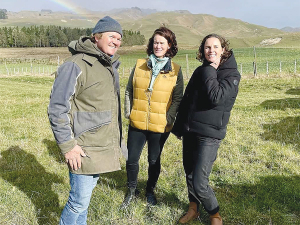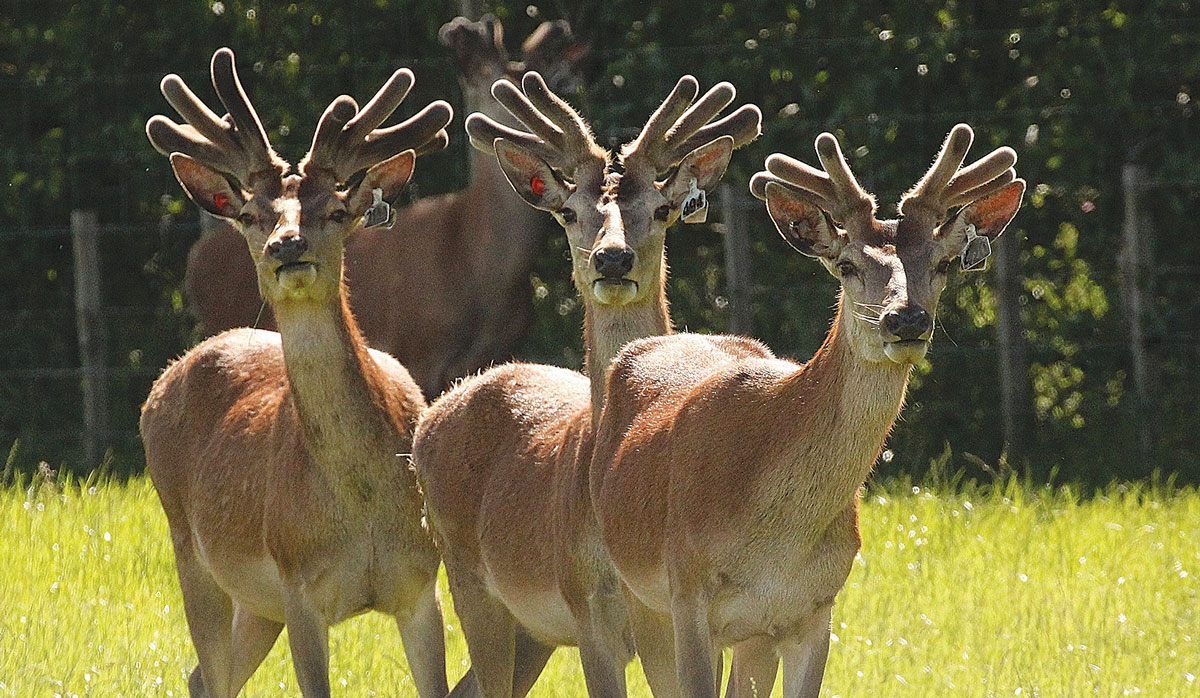OSPRI writes off $17m over botched traceability system
Animal disease management agency OSPRI has written off nearly $17 million after a botched attempt to launch a new integrated animal disease management and traceability system.
 Deer Industry NZ chair Mandy Bell (centre) with Hastings deer farmers Ru and Kate Gaddum during a field day this month.
Deer Industry NZ chair Mandy Bell (centre) with Hastings deer farmers Ru and Kate Gaddum during a field day this month.
The mood in the deer industry is very positive and on an upwards trajectory.
That's the view of Deer Industry NZ (DINZ) chair, Mandy Bell following their recent conference in Hawke's Bay.
Bell - a deer farmer and a veterinarian - says almost half of the one-day conference was taken up discussing opportunities that are opening up for the sector which in the past has had something of a rollercoaster ride.
She told Rural News the 200 people attending the conference wanted to look to the further rather than focus on internal matters. There was much talk about 'value chains' and many of the processors and marketers were at the conference to give some good 'intel'. Bell says the venison market is looking up, with a reasonable split of product going to China, Europe and the US.
"We're now heading to a situation where there is more demand than supply. The US is where we are well rewarded for our venison.
"That's when you start talking about value chains and see venison going directly from producers into very specific markets," she says.
Bell says there was word of some exciting things happening in the velvet space as well as the venison space. She acknowledges there is a problem getting frozen velvet into China at present but says DINZ is working closely with Ministry for Primary Industries (MPI) and the Chinese authorities to get this velvet classified as an agricultural product. If that can be done, access for that product into China will resume.
China impors roughly 60% of our velvet, but half of this is reprocessed there and re-exported to Korea.
Other issues discussed at the conference were genetics, forages, diversification and the environment. Regarding the latter, Bell says there is a mood of greater confidence in the sector with the arrival in office of the new coalition Government and hope that a more pragmatic approach to regulations will be delivered.
"Right from the outset deer farmers have been positive about environmental outcomes on their farms. Fresh water is important, greenhouse gases are important, but there is need for pragmatism because a lot of good work is being done by our farmers," she says.
Fencing Costs
 |
|---|
|
The venison market is looking up, with a reasonable split of product going to China, Europe and the US. |
Fencing off waterways in the hill country is a big issue for members because it is far more costly to erect a deer fence than one for sheep and cattle, says Mandy Bell.
She says a lot of deer farmers are measuring water quality and the result is good water. She questions the need for them to spend $35,000 to fence off a couple of small creeks high up in the hills where the deer are not making any impact on water quality.
"Where you have low stocking rates, the water quality is good. It's important to note that the deer industry has been running a fantastic project involving ten farms over five years with three scientists visiting each of the properties regularly, checking and sampling the water in the streams," she says.
Bell says DINZ has a very good understanding about deer and water quality.
After the main conference, delegates had the opportunity to visit Rangimoe, a successful and well-established deer farm at Kereru in the western hills behind Hastings.
Owned by the Gaddum family, the property was established by Dick Gaddum, the grandfather of Ru, who runs the farm with his wife Kate. Bell says the property is a wonderful legacy to Dick Gaddum and the extended family.
"Overall, it was a great conference and we are all looking forward to next year, which will be the 50th in the history of the organisation. That event will be held in Queenstown," she says.
The Government's chief science advisor, Dr John Roche says the key objective for the science sector in the coming year is bedding down the reforms which sees the merger of the previous entities.
Hawke's Bay apple grower Taylor Corporation says a standout 2026 season, coming after a few difficult years, is boosting optimism among growers.
Horticulture New Zealand (HortNZ) has added its perspective to numerous primary sector voices urging the Government to strengthen its draft legislation to replace the Resource Management Act (RMA).
The Commerce Commission has finalised new information disclosure requirements for local councils and water organisations that deliver water supply and wastewater services.
Beef + Lamb NZ (B+LNZ) is calling for significant changes to the Government’s reforms to the Resource Management Act (RMA).
NZPork says the Government needs to strengthen its proposed planning laws to ensure New Zealand's pig farmers can continue to produce pork.

OPINION: The proverbial has really hit the fan in Wellington and exposed a glaring example of a double standard in…
OPINION: Dark suited spin doctors exist to, well, spin, and the nice cuddly progressive types at Greenpeace Aotearoa practice this…